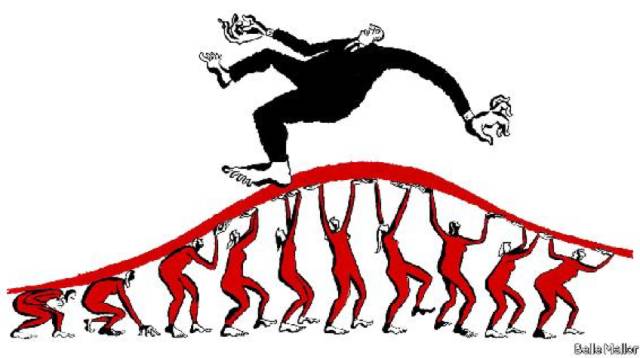This year has seen an explosion of rage about sexual harassment
Will it lead to lasting change?
Dec 19th 2017
YOU have applied for a job and the interviewer asks you a question that lands like a bombshell: do you have a boyfriend? Then another: do people find you desirable? And a third: do you think it is important for women to wear bras to work? If you are a woman you probably know what you would do. Perhaps you would refuse to answer, complain or walk out. You would certainly be furious.
This is how 197 female American undergraduates, asked to imagine such an interview, said they would react. But they—and probably you—were wrong. The psychologists who asked them, Marianne LaFrance and Julie Woodzicka, orchestrated a real-life version of this ordeal, by advertising for a research assistant and arranging for male accomplices to interview the first 50 women who applied. Half were randomly chosen to be asked those three questions. Not one refused to answer, let alone complained or walked out. When they were asked afterwards (and offered the chance to apply for a real job), they said they had felt not anger, but fear.
bombshell: something that is very surprising or shocking
orchestrate: to organize or plan something that is complicated
ordeal: an experience that is very unpleasant or difficult
accomplice: a person who works with or helps someone who is doing something wrong or illegal
An ethics review board had let the experiment go ahead when it was assured that the interviewers would go no further than off-colour questions. And yet videos of the interviews showed how much this supposedly minor sexual harassment threw the women off their stride. They plastered on fake smiles, ummed and ahhed, paused and trailed off more often than the control group. Ms LaFrance, who studies non-verbal communication, says they “screwed up the interviews”.
In a final twist, the researchers showed clips of the videos to male MBA students. Fake smiles are fairly easy to tell from real ones: they involve fewer facial muscles and do not crinkle the corners of the eyes. But many of the men saw the women as amused, even flirtatious. Men often lack the motivation to read the signs of women’s feelings, says Ms LaFrance. But they can learn if they want to. When she offered course credit to the students who learned to spot the fake smiles, plenty succeeded.
plaster on fake smiles: 脸上堆满假笑,用的也是真的好
假笑是很容易看出来的,因为它比真笑用比较少部分的脸部肌肉,而且眼角的皱纹不会出来。 虽然很多男人不留意女人的面部表情感受,但如果让他们注意,他们是能分清的
This experiment was carried out in 2001, long before the events of 2017 blew open the extent of sexual harassment of women at work by powerful men. But it was a masterful demonstration of how such abuse works—and of the misconceptions that have enabled it to continue for so long. It revealed the differences between what women think they would do if they were sexually harassed and what they actually do; between the perception of verbal harassment as trivial and the harm it causes to women’s work performance; between women’s and men’s notions of what counts as sexual harassment; and between women’s feelings and men’s perceptions of them.
This year has shown that these differences are still wide. It has seen the long-overdue punishment of some brutish men who had groped and leered their way round their workplaces.But has there been a permanent shift in what society will tolerate? Or will the moment pass, and a new generation of powerful men slyly take up where a previous one left off?
上面那个实验是2001年做的,离2017年性骚扰事件的爆发已经过去很久了。女人想象自己在遇到性骚扰时候的反应和真正遇到性骚扰的时候的反应是不同的
提出了本文的问题!!
One place to look for an answer is in the way other social norms have changed. From the abolitionists’ fight against slavery in the 19th century, to campaigns against domestic violence in the 1970s, to demands for same-sex marriage from the 1990s, progress comes in stops and starts, with many reversals. Campaigners must defeat vested interests, incomprehension and ridicule. Cristina Bicchieri, a philosopher at the University of Pennsylvania and the author of “Norms in the Wild”, a book about social rules, has a warning: “Don’t expect the birth of a new norm to be easy.”
From the top
With hindsight, this year’s flood of allegations had its source in 2016. During Donald Trump’s presidential campaign, a sound recording revealed him boasting of serial harassment and groping. His election just a month later showed that American politics had become so polarised that this did not disqualify him in the eyes of most Republican voters—though Alabamans rejected Roy Moore in a Senate race this month, after he had been accused of harassment and assault by several women, including one who was 14 at the time. And yet among some people MrTrump’s victory inspired a longing for powerful, abusive men to face a reckoning. The Women’s March against his inauguration was the biggest day of protest in America’s history.
这个问题的答案可以从其他社会问题那里得到,从废除奴隶制度、到反家庭暴力、到争取同性婚姻,这些一点点的进步都是来之不易的,有很多的反反复复。
polarise: to cause (people, opinions, etc.) to separate into opposing groups
The dam broke in October, with accusations of harassment and assault against Harvey Weinstein, a film producer. Since then dozens of prominent men in show business, journalism and politics have been accused of sexual harassment, and been sacked or stepped down. The #MeToo hashtag has already been used 4.7m times on Twitter by women(and a few men) whose harassers were not famous enough to make the news.
Both sexes have found the outpouring astonishing. Many men are amazed to learn that so many women have suffered sexual harassment. For women the surprise is that perpetrators are being punished at last.
perpetrate: to do something that is illegal or wrong
perpetrator
perpetration
这是一篇超级长的文章,我把它分作了三部分,这是第一部分。
-----------------------------------------------------------------------------------------------------------------------------
Results
Lexile®Measure: 1000L - 1100L
Mean Sentence Length: 16.10
Mean Log Word Frequency: 3.40
Word Count: 837
这篇文章的蓝思值是在1000-1100L, 适合英语专业大一大二的水平学习,应该是经济学人里属于最简单的了
使用kindle断断续续地读《经济学人》三年,发现从一开始磕磕碰碰到现在比较顺畅地读完,进步很大,推荐购买!点击这里可以去亚马逊官网购买~
